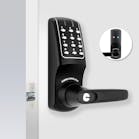At one stage in life I worked for a lock manufacturer and travelled extensively around the country training locksmiths. If there was any one underlying fact learned after meeting hundreds of locksmiths, it was that the business of locksmithing is similar no matter if you live south, north east or west. That same lesson was discovered again recently during a business trip to Scandinavia. The products, procedures, heartaches and successes in locksmithing are no different in Europe than they are in the United States.
During the last week of January, I was fortunate enough to attend a locksmith convention in Norway. The convention was located in a beautiful mountainous area 100 miles north of Oslo. With a cross country ski area in the background, more than 400 locksmiths gathered for three days of security training.
Training classes consisted of many topics including lock picking, impressioning, access control and lock bypassing. I acquired some new procedures after sitting in on several classes. All classes were professionally presented and well attended.
Manufacturers and distributors filled a convention floor on Saturday to display their latest products. Familiar manufacturer names such as Assa Abloy, Ingersoll Rand, Silca, DORMA and Bianchi displayed many of the same products found at any locksmith convention in North America. Transponder programming tools, high security lock cylinders and access control products were featured throughout the convention floor.
Norwegian Locksmiths (NL) stages this event every year during the last week in January. Locksmith business owners usually pay the cost of sending their employees to the convention. The idea is that well-trained employees become more productive employees. A friendly atmosphere, first class education, large convention facility plus great buffets all made for a very productive and enjoyable weekend. My thanks to NL for allowing me to attend.
Before returning, I visited a locksmith business in Copenhagen, Denmark, which is owned by Hans Mejlshede. Mr. Mejlshede employs more than 50 people in his business. He is one of the largest selling Medeco dealers in Europe and has a full time staff of locksmiths rekeying Medeco cylinders. If an unusual housing does not exist, his in-house machine shop can quickly fabricate housings to accept a Medeco plug and complete the job.
Another area in his 25,000-square-foot building has CNC equipment to fabricate stainless steel pieces for kick plates or escutcheon plates. An electric hoist and fork lift unit are available to move safes. Special software was developed to help his phone operators monitor and track job orders. A quiet sense of efficiency and purpose was noted in every corner of the business.
Hans Mejlshede is also President of the Danish Locksmith Federation (DLF) and former President of the European Locksmith Federation (ELF). Locksmith business owners from around Denmark invest notable annual dues to be part of the Federation. DLF works with business and government leaders, insurance companies and manufacturers to assure the best possible business climate for DLF members.
After leaving Scandinavia I tried to put my visit into some kind of perspective. Our system in the U.S. for helping locksmiths has always focused on education. Whether at ALOA or elsewhere, once the class is over, you are on your own to find work.
The European system has the same problems we do. An article in an ELF publication lists some of their problems as: “rogue locksmiths advertising in phone books,” “manufacturers dealing directly with end-users,” “hardware stores getting more involved in locksmith work,””maintenance people doing locksmiths work,” “internet sales of locks and technical information.”
Groups like DLF and ELF are doing something about it. They are working with lock manufacturers and insurance companies so locksmiths can become the security leader instead of the business of last resort. Federations such as DLF and ELF are actively placing their name before the public so people recognize them as the authority in security matters. As a result, locksmiths in several additional countries across Europe are requesting membership in ELF while membership in most U.S. locksmith associations is decreasing.
Education is important and necessary, but it is not enough.
Without some organized system for generating business as a group, we cannot hope to achieve any better conditions than we currently face. Perhaps we can borrow some of the ideas and talent from our European counterparts.




